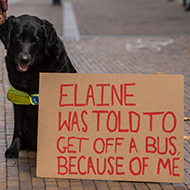
Eighty-one per cent of guide dog owners have been refused entry to businesses or services.
Guide Dogs has launched a campaign to highlight how illegal access refusals continue to impact the lives of guide dog owners across the country.
It comes following research by the charity that found 81 per cent of guide dog owners have been refused entry to businesses or services because they have their guide dog with them.
Of these, 73 per cent of guide dog owners said they had experienced at least one refusal in the past 12 months. For 49 per cent, concerns over access refusals meant some individuals had to change or restrict their plans.
To highlight this growing problem, a group of guide dog owners hopes to educate the public and businesses and boost understanding of how experiencing an access refusal can leave nearly one in five respondents feeling frustrated, sad, and humiliated.
The six owners and their dogs have gathered to showcase the impact access refusals have had on their lives via a series of striking images highlighting the venues they have been denied entry.
They are backed by Guide Dogs 'Open Doors' campaign, spearheaded by a new, free-of-charge app to empower dog owners to report illegal access refusals.
Guide dog owner and campaigner Brian Lawson said: “Like many guide dog owners, I have experienced access refusals. It is upsetting and makes me feel rejected and worried about making future plans. One of the worst occasions for me was being refused by a taxi after visiting my dying relative, despite having pre-booked and confirming I am a guide dog user.
“I hope this campaign helps to change the dial and make a long-lasting change by educating the public and business owners alike so that these types of refusals don’t happen again to anyone like me.”
Additional research by Guide Dogs found that nearly half (47%) of retail staff and 19 per cent of hospitality staff were unaware that refusing a guide dog is illegal. One in two (51%) said they would struggle to identify a guide dog or assistance dog from a pet dog.
More than a third of the general public (36%) also admitted they didn't know refusing entry to a guide dog owner is illegal. Despite this, are clear they want to see businesses take action against discrimination.
Blanche Shackleton, head of policy, public affairs and campaigns at Guide Dogs, said: "Guide dog owners deserve to be able to live their lives the way they want and feel confident, independent and supported in the world. The law is clear, and yet guide dog owners continue to experience access refusals, which are almost always illegal.
“We have listened to the concerns of guide dog owners and in response, we have launched the Open Doors campaign. The first element of this is the launch of our game-changing new app that makes it quick and easy for guide dog owners to report access refusals to us, get support, or educate businesses on access rights. We’re coupling this with our ask of government to strengthen the law in relation to access refusals to end them once and for all”.



 The Veterinary Medicines Directorate (VMD) is inviting applications from veterinary students to attend a one-week extramural studies (EMS) placement in July 2026.
The Veterinary Medicines Directorate (VMD) is inviting applications from veterinary students to attend a one-week extramural studies (EMS) placement in July 2026.